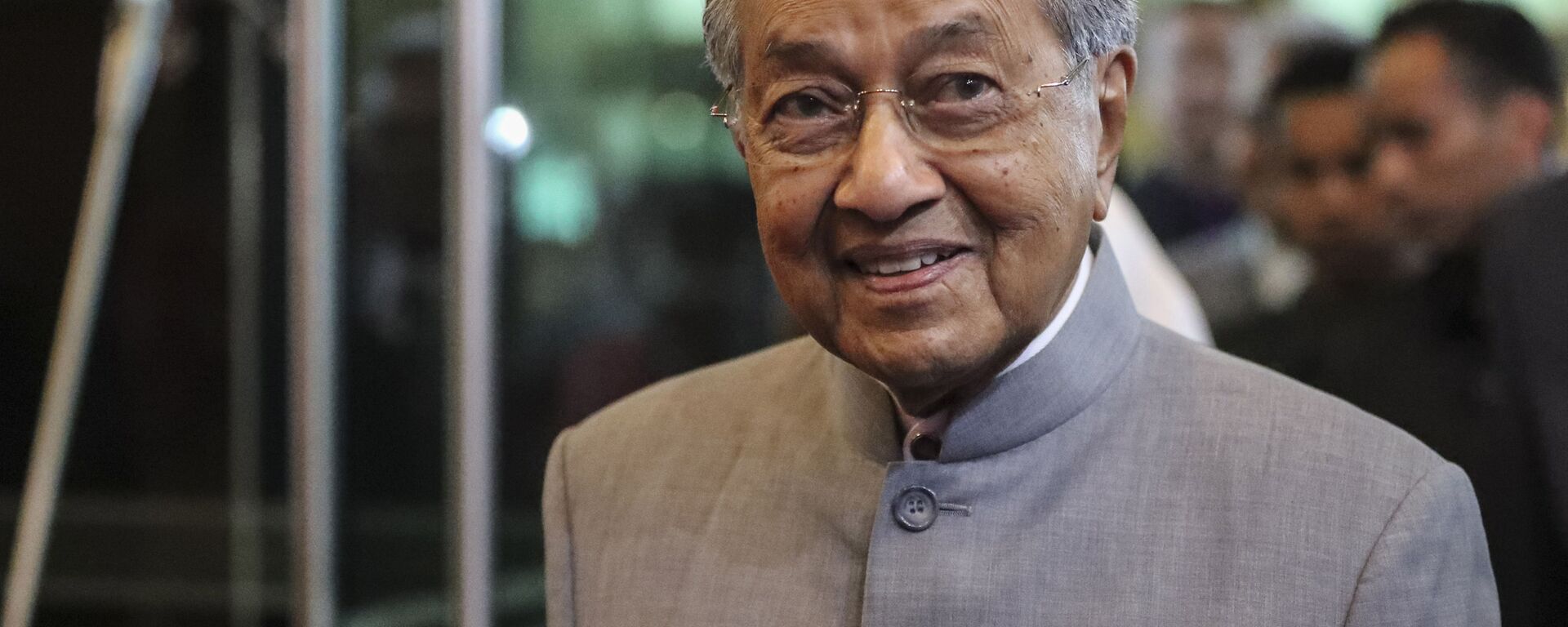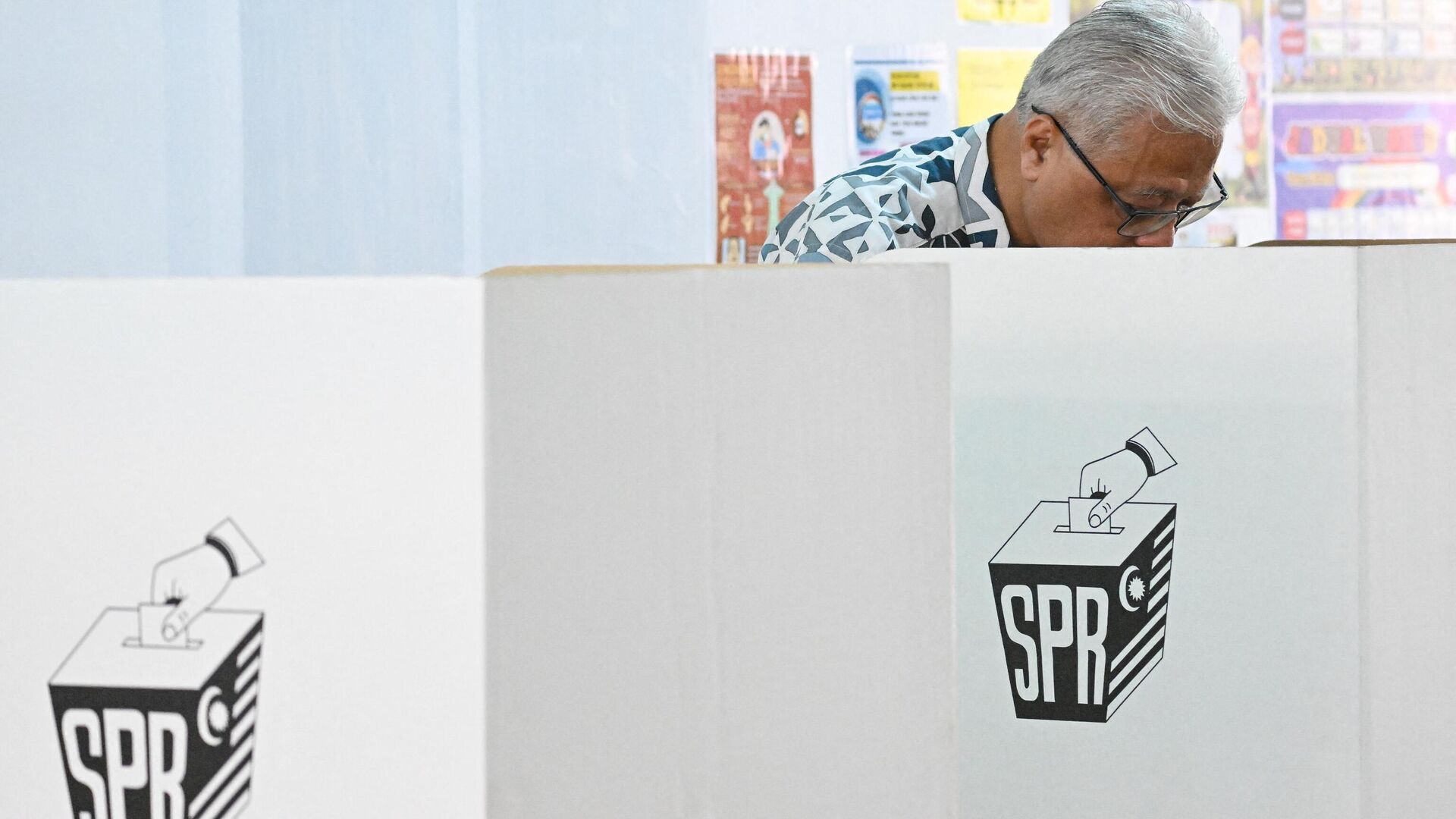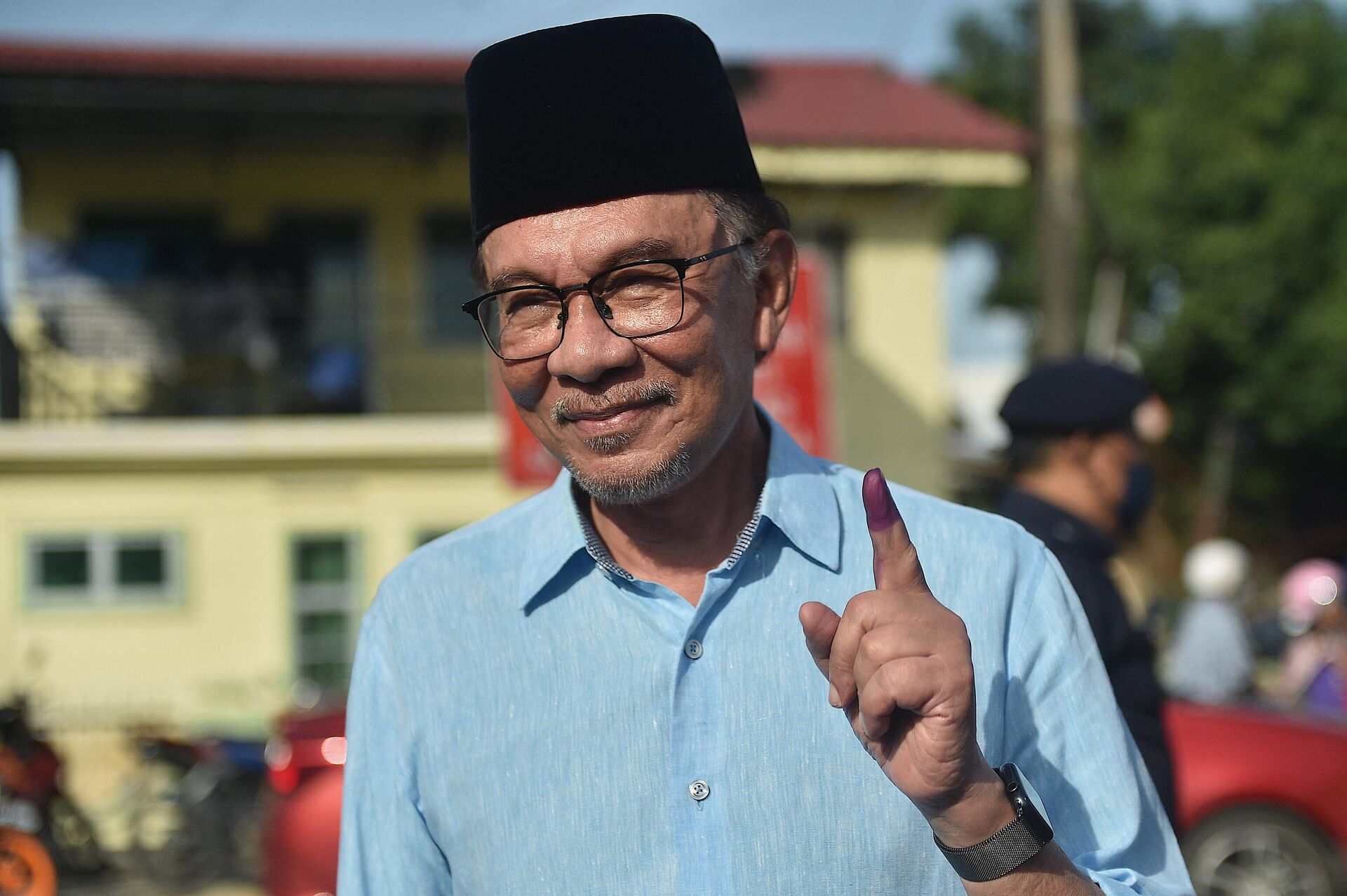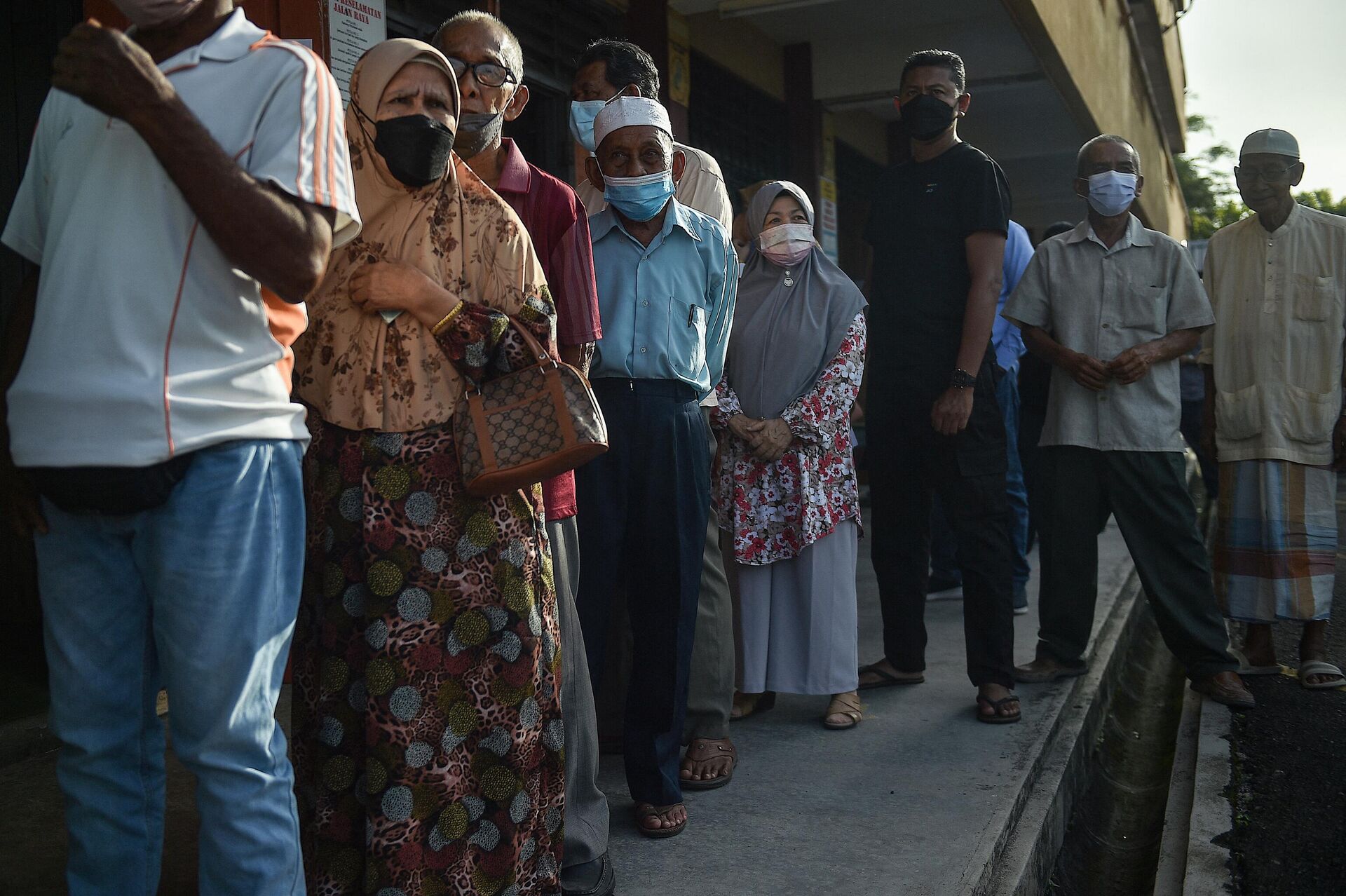https://sputnikglobe.com/20221119/3-reasons-why-2022-malaysia-elections-are-important-to-follow-1104416788.html
Three Reasons Malaysia's 2022 Elections Are Important to Follow
Three Reasons Malaysia's 2022 Elections Are Important to Follow
Sputnik International
Malaysia is holding general elections
2022-11-19T06:52+0000
2022-11-19T06:52+0000
2025-11-24T13:33+0000
malaysia
general elections
cost of living
electorate
sputnik explains
corruption
https://cdn1.img.sputnikglobe.com/img/07e6/0b/13/1104415861_0:160:3073:1888_1920x0_80_0_0_054cba5fa6be0baa5a7ba59cdeee3115.jpg
As Malaysia's federal constitutional monarchy holds its 15th general election on 19 November, a month after Prime Minister Ismail Sabri Yaakob dissolved the country's parliament, the race is expected to be a tight one, with three leading coalitions jostling for power.The Southeast Asian nation’s 21.1 million eligible voters will head to the more than 9,000 polling centers on Saturday to cast their ballot for lawmakers in the 222-seat lower house and regional legislatures. The parties and coalitions hoping to form a government in a single bloc will need 112 seats. The general elections come in the wake of protracted political instability since the 2018 polls, which were fraught with infighting and resulted in the nation having three prime ministers since that time.The head of the party winning the majority of votes normally becomes prime minister. The states of Malacca, Johor, Sarawak and Sabah have already held their vote and will not participate in the Saturday election.Here are several key aspects of the tightly contested election.Who are the Frontrunners in Malaysia's General Elections?Hoping to win a strong mandate in Malaysia's general election are three main political forces: the ruling National Front coalition, led by current Prime Minister Ismail Sabri Yaakob's United Malays National Organization (UMNO); the Perikatan Nasional, or National Alliance coalition under the leadership of Muhyiddin Yassin; and the opposition coalition led by Anwar Ibrahim.The history of Malaysia's largest and oldest political party, UMNO is linked to the recent 1Malaysia Development Berhad (1MDB) scandal, that implicated former Prime Minister Najib Razak, who is currently behind bars, serving a 12-year sentence.Former deputy prime minister and opposition leader Anwar Ibrahim’s Pakatan Harapan (PH), or Alliance of Hope multiethnic coalition has enjoyed growing support, according to surveys. However, recent forecasts suggest it will not manage to secure a majority. Ibrahim's party revelled in its 2018 victory over the National Front, but internal strife brought down the coalition, led at the time by Mahathir Mohamad.Several other polls indicated that the Barisan Nasional, or the National Front alliance, could put in a strong showing. Former Prime Minister Muhyiddin Yassin's Malay-based bloc - Perikatan Nasional - is deemed to be something of a dark horse. Yassin's party, the Malaysian United Indigenous Party (abbreviated to Bersatu) clinched an alliance with the Malaysian Islamic Party along with the Malaysian People's Movement Party.The National Front currently wields 19 percent of the federal assembly seats, with the National Alliance having 21 percent and the Hope Pact holding 41 percent.Who is Voting in Malaysia's General Election?A rogue element in this general election is the youth vote since the constitutional amendment of 2019 lowering the legal voting age from 21 to 18. This, in effect, added an estimated 1.4 million voters aged between 18 and 21 to the overall electorate of about 21.17 million. One novel aspect of the campaigning ahead of the elections has reportedly been a markedly broad use of social media platforms, such as TikTok, to woo these new voters. Another departure has been automatic voter registration (AVR).What Are the Voter's Top Concerns?Government honesty is one of the key concerns after the turmoil that has recently tainted the political spectrum in the Southeast Asian country. The economy and growing cost of living are also seen as important concerns for the electorate.Heavy rains could play a role in the voting, as flooding has already hit parts of the country. Malaysia's king Abdullah of Pahang (full name Al-Sultan Abdullah Ri'ayatuddin Al-Mustafa Billah Shah ibni Almarhum Sultan Haji Ahmad Shah Al-Musta'in Billah) decreed that elections must be held before the seasonal floods. The Northeast monsoon typically hits the nation between November and March. In a slight tweak to the timeframe, voting has been extended by the Election Commission from nine to 10 hours. Results of the general elections are expected to start coming through some time late on Saturday.
https://sputnikglobe.com/20200224/malaysian-prime-minister-mahathir-reportedly-submits-resignation-to-king-1078390071.html
malaysia
Sputnik International
feedback@sputniknews.com
+74956456601
MIA „Rossiya Segodnya“
2022
News
en_EN
Sputnik International
feedback@sputniknews.com
+74956456601
MIA „Rossiya Segodnya“
Sputnik International
feedback@sputniknews.com
+74956456601
MIA „Rossiya Segodnya“
malaysia’s 2022 election, federal constitutional monarchy, tightly contested election, three leading coalitions jostling for power, who are frontrunners in malaysia's general elections, lowered legal voting age from 21 to 18, government integrity, economy and growing cost of living the electorate's chief concerns
malaysia’s 2022 election, federal constitutional monarchy, tightly contested election, three leading coalitions jostling for power, who are frontrunners in malaysia's general elections, lowered legal voting age from 21 to 18, government integrity, economy and growing cost of living the electorate's chief concerns
Three Reasons Malaysia's 2022 Elections Are Important to Follow
06:52 GMT 19.11.2022 (Updated: 13:33 GMT 24.11.2025) Malaysia is holding a general election on 19 November, with the rising cost of living, inflation and government honesty likely to be some of the most important topics that will determine how the country's 21.1 million eligible voters cast their ballots when choosing the 222 lawmakers for the lower house of parliament.
As Malaysia's federal constitutional monarchy holds its 15th general election on 19 November, a month after Prime Minister Ismail Sabri Yaakob dissolved the country's parliament, the race is expected to be a tight one, with three leading coalitions jostling for power.
The Southeast Asian nation’s 21.1 million eligible voters will head to the more than 9,000 polling centers on Saturday to cast their ballot for lawmakers in the 222-seat lower house and regional legislatures. The parties and coalitions hoping to form a government in a single bloc will need 112 seats.
The general elections come in the wake of protracted political instability since the 2018 polls, which were fraught with infighting and resulted in the nation having three prime ministers since that time.
The head of the party winning the majority of votes normally becomes prime minister. The states of Malacca, Johor, Sarawak and Sabah have already held their vote and will not participate in the Saturday election.
Here are several key aspects of the tightly contested election.
Who are the Frontrunners in Malaysia's General Elections?
Hoping to win a strong mandate in Malaysia's general election are three main political forces: the ruling National Front coalition, led by current Prime Minister Ismail Sabri Yaakob's United Malays National Organization (UMNO); the Perikatan Nasional, or National Alliance coalition under the leadership of Muhyiddin Yassin; and the opposition coalition led by Anwar Ibrahim.
The history of Malaysia's largest and oldest political party, UMNO is linked to the recent 1Malaysia Development Berhad (1MDB) scandal, that implicated former Prime Minister Najib Razak, who is currently behind bars, serving a 12-year sentence.
Former deputy prime minister and opposition leader Anwar Ibrahim’s Pakatan Harapan (PH), or Alliance of Hope multiethnic coalition has enjoyed growing support, according to surveys. However, recent forecasts suggest it will not manage to secure a majority. Ibrahim's party revelled in its 2018 victory over the National Front, but internal strife brought down the coalition, led at the time by
Mahathir Mohamad.

24 February 2020, 06:24 GMT
Several other polls indicated that the Barisan Nasional, or the National Front alliance, could put in a strong showing. Former Prime Minister Muhyiddin Yassin's Malay-based bloc - Perikatan Nasional - is deemed to be something of a dark horse. Yassin's party, the Malaysian United Indigenous Party (abbreviated to Bersatu) clinched an alliance with the Malaysian Islamic Party along with the Malaysian People's Movement Party.
The National Front currently wields 19 percent of the federal assembly seats, with the National Alliance having 21 percent and the Hope Pact holding 41 percent.
Who is Voting in Malaysia's General Election?
A rogue element in this general election is the youth vote since the constitutional amendment of 2019 lowering the legal voting age from 21 to 18. This, in effect, added an estimated 1.4 million voters aged between 18 and 21 to the overall electorate of about 21.17 million.
One novel aspect of the campaigning ahead of the elections has reportedly been a markedly broad use of social media platforms, such as TikTok, to woo these new voters. Another departure has been automatic voter registration (AVR).
What Are the Voter's Top Concerns?
Government honesty is one of the key concerns after the turmoil that has recently tainted the political spectrum in the Southeast Asian country. The economy and growing cost of living are also seen as important concerns for the electorate.
Heavy rains could play a role in the voting, as flooding has already hit parts of the country. Malaysia's king Abdullah of Pahang (full name Al-Sultan Abdullah Ri'ayatuddin Al-Mustafa Billah Shah ibni Almarhum Sultan Haji Ahmad Shah Al-Musta'in Billah) decreed that elections must be held before the seasonal floods. The Northeast monsoon typically hits the nation between November and March. In a slight tweak to the timeframe, voting has been extended by the Election Commission from nine to 10 hours. Results of the general elections are expected to start coming through some time late on Saturday.




